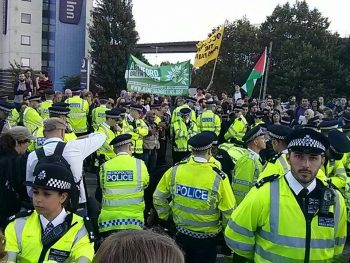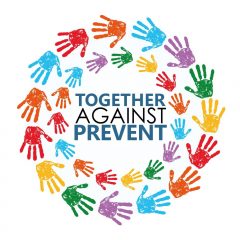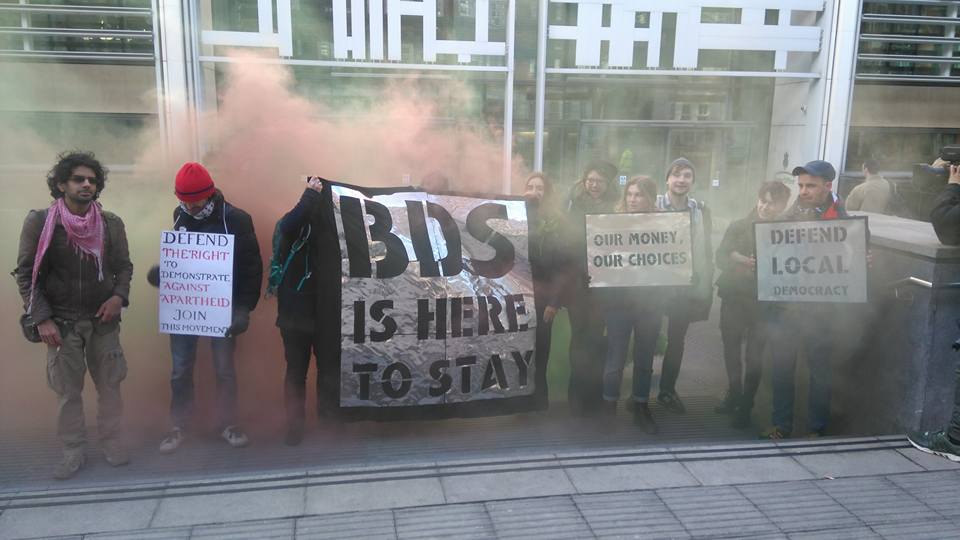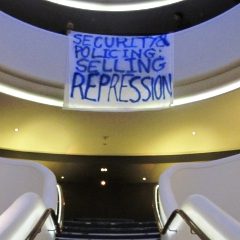Security & Policing: the public face of an increasingly repressive nation
The government is capitalising on public fear to hold back peaceful dissent in the UK and deepen its ties to repressive regimes around the world.

In liberal-democracies like the UK, conservative state powers face a potential barrier: how can they advance militarist agendas, and hold back effective protest movements that challenge their power, whilst still projecting the image of a nation that values freedom and critical debate?
Under the climate of fear that comes with recent terrorist atrocities, policy initiatives pushed under the guise of national security have increasingly far reaching consequences. In times of perceived insecurity, issues become “securitised” when they are presented as a universal threat that requires an extreme response from the state. As we become desensitised to the creeping militarism and surveillance this brings, we are told to let go of our civil liberties and to be more suspicious of those around us.
Some “counter-terror” initiatives have a clear link with militarism and the arms trade; like the increase of armed police on the streets after the Paris attacks and arms company stock prices soaring when the UK announced it would join the bombing of Syria. But these “hard-power” responses bring with them more creeping, insidious policies that, in the name of fighting “extremism”, risk dividing movements and holding back change. As we take action against human rights abuses in the UK and around the world, we must also stand against the less obvious forces that threaten to hold back our struggles.
Preventing Progress
Projecting the “war on terror” into our classrooms and community centres, Prevent is a government initiative that seeks to position public sector workers as proxy security forces charged with stamping out “non-violent extremism”. Extremism is troublingly identified in the original Prevent guidance as “vocal or active opposition to fundamental British values including democracy, the rule of law, individual liberty and mutual respect and tolerance of different faiths and beliefs”. Under the Bill, those working in schools and universities have a duty to “create an environment where extremism cannot operate” and as such to report any students suspected to be “at risk”, with the threat of legal penalties for individual employees if they cannot prove that they are taking steps to do this.

The Prevent guidance is racist in its nature. It explicitly brands aspects of Islamic identity as pre-cursors for extremism, to be stacked against other “criteria”. This creates a situation where, for example, university staff could feel legally obliged to report Muslim students who are critical of UK foreign policy, but to ignore non-Muslim students with the same views. The racialised nature of the Bill and its high potential to cause individual trauma are good enough reasons to oppose it. There have now been a large number of cases where very young children are reported through the programme and last year a student at Staffordshire University was reported for simply reading a book.
But the potential impacts of Prevent go even further. In a chilling passage, the guidance states that “Muslims facing apparent or real social discrimination and socio-economic disadvantage” find “just cause” in terrorism, and that “radicalisation occurs as people search for identity, meaning and community”. Blurring into the language of ‘domestic extremism’, this gives quasi-legal basis to target any groups that question state power, whether their actions are classed as illegal or not. Confirming the fears of many, there is now clear evidence that the shaky definition of “extremism” offered in Prevent training is being broadened to the point that it targets peaceful anti-fracking activists.
Spreading further
Prevent is iconic of a broader policy logic that increasingly blurs the lines between activist and terrorist. In the latest move of this kind, the Tories recently unveiled plans to restrict the power of local councils to boycott Israel’s illegally occupied territories or companies that produce weapons. The press release that followed branded those who support such boycotts “militants”, claiming that they undermine “international security” and hold back measures necessary to “tackle Islamic extremism”.

Recently, over 25 grassroots human rights groups – many of them working on Palestine solidarity – and one humanitarian charity, Islamic Relief, have had their bank accounts closed on the dubious basis of “international risk”, even though many of them make no overseas transactions. As a spokesperson for Islamic Relief commented: “(the) vagueness of counter-terrorism regulation has created a fog of uncertainty…that governments need to do more to help us navigate our way through.” Indeed, a government that truly cared about the potential impacts of stigmatising and restricting those working for positive social change would surely intervene.
Challenging the festival of repression

Hosted by the home office, the upcoming Security & Policing arms fair is a “discreet environment” for the UK government to play match-maker between arms companies and repressive regimes around the world. It will bring together companies like Serco, who profit from the detention of thousands of refugees, and BAE systems, whose warplanes are currently bombing civilians in Yemen, with military and police delegations from countries like Bahrain, UAE and Iraq. Events like Security & Policing derive profit from misery, and render the UK complicit in human rights abuses around the world.
How can the government present peaceful activists as a security threat when it is arming some of world’s most dangerous and tyrannical regimes? We must challenge the government’s rhetoric about protecting national security through militarism or we give it an excuse to deepen its ties with arms companies through events like Security & Policing. And we must give a show of strength in the face of policies like Prevent, to prove that toxic rhetoric and stigmatisation will not divide our movements, or stop us from standing up for peace and justice.
Shameful events like Security & Policing are the public face of institutionalised militarism and repression – please join us on 9th March to take action against it.
Parts of this post were drawn, with permission, from more detailed articles originally published here.
Get your organisation to join the ‘Together Against Prevent‘ campaign. More info here



No replies to “Security & Policing: the public face of an increasingly repressive nation”